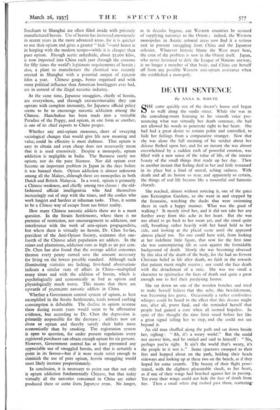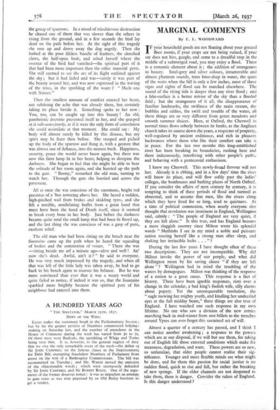DEATH SENTENCE
Ry ANNA D. WIIYTE SHE came quickly out of the doctor's house and began to walk along the sunlit street. While she was in the consulting-room listening to his smooth voice pro- nouncing what was virtually her death sentence, she had not allowed his words to penetrate right to her heart. She had had a great desire to remain polite and controlled, to hide her feelings from a comparative stranger. Now that she was alone the full meaning of his verdict about her diiease flashed upon her, and for an instant she was almost overwhelmed by a sudden rush of powerful emotion, was filled with a new sense of the value of life, of the intense beauty of the small things that made up her day. Then in another instant that feeling died in her and little remained in its place but a kind of unreal, aching sadness. With death and all its horror so near, and apparently so certain, the things of real life became like a mournful and fantastic charade.
She reached, almost without noticing it, one of the gates into Kensington Gardens, so she went in and stopped by the fountains, watching the ducks that were swimming there in such a , happy manner. What was the good of walking ? It merely tired her, and it did not take her any further away from this ache in her heart. But she was too afraid to go back to her room yet, and she stood quite still, breathing rather heavily with her hand held to her side, and looking at the placid scene until she appeared almost placid too. No one could have told, from looking at her indefinite little figure, that now for the first time she was contemplating life as seen against the formidable background of death. Slowly she was becoming obsessed by this idea of the death of the body, for she had no fervent Christian belief in life after death, no faith in the rewards that patient merit might receive ; nor could she face death with the detachment of a stoic. She was too small a character to spiritualise the facts of death and quite a great enough one to feel their paralysing horror.
She sat down on one of the wooden benches and tried to make herself believe that this ache, this bewilderment, was becoming less grave. Occasionally a rather comfortless whisper could be heard to the effect that this disease might not, after all, prove fatal, and she reminded herself that people had gained a cure when all seemed hopeless. In spite of this thought the time limit stood before her like a great signal telling her to stop, and she could not see beyond it.
An old man shuffled along the path and sat down beside her, sighing : " Ah, it's a weary world." But she could not answer him, and he smiled and said to himself : " No, perhaps you're right. It ain't the world that's weary, it's the people in it wot is." Some sparrows swooped to their feet and hopped about on the path, holding their heads sideways and looking up at these two on the bench, as if they hoped for some crumbs. The beauty of their flight pene- trated, with the slightest pleasurable shock, to her heart, as if one of their wings had brushed against her in passing. Yet even their wings could not hide the face of death from her. Then a small white dog rushed past them, scattering- the group of sparrows. In a mood of mischievous destruction he chased one of them that was slower than the others in rising from the ground, and in a few seconds the bird lay dead on the path before her. At the sight of this tragedy she rose up and drove away the dog angrily. Then she looked at the poor lifeless bundle of feathers, the clenched claws, the half-open beak, and asked herself where the essence of the bird had vanished—the spiritual part of it that had been more important than the other material parts. She still seemed to see the arc of its flight outlined against the sky ; but it had faded and was—surely it was part of the beauty around her, and was now expressed in the waving of the trees, in the sparkling of the water ? " Made one with Nature."
Then the smallest amount of comfort entered her heart, not subduing the ache that was already there, but certainly taking its place beside it. Something spoke to her now : You, too, can be caught up into this beauty ! An old, pantheistic doctrine presented itself to her, and she grasped at it sub-consciously, as if it were the only form of consolation she could assimilate at that moment. She could say : My body will almost surely be killed by this disease, but my spirit may be freer than before. She stooped and picked up the body of the sparrow and flung it, with a gesture that was almost one of defiance, into the nearest bush. Happiness, security, peace she would never know again, but there was now this faint lamp lit in her heart, helping to dissipate the darkness. She began to feel that she might be able to bear the solitude of her room again, and she hurried up the path to the gate. " Barmy," remarked the old man, turning to watch her. Through the gate she hurried and across the pavement.
All at once she was conscious of the enormous, bright red presence of a 'bus towering above her. She heard a sudden, high-pitched wail from brakes and skidding tyres, and she felt a terrible, annihilating buffet from a great hand that must have been the hand of Death itself, since it seemed to break every bone in her body. Just before the darkness became quite total the small lamp that had been lit flared up, and the last thing she was conscious of was a gasp of pure, exultant relief.
The old man who had been sitting on the bench near the fountains came up the path when he heard the squealing of brakes and the commotion of voices. " There she was —sitting beside me arf a minute ago—alive and well ! An' now she's dead. Awful, ain't it ? " he said to everyone. He was very much impressed by the tragedy, and when all that was left of the little lady was taken away, he had to go back to his bench again to recover his balance. But he was more convinced than ever that it was a weary world and quite failed to notice, if indeed it was so, that the fountains sparkled more brightly because the spiritual part of his neighbour had entered into them.











































 Previous page
Previous page